Poodle Behavior
Poodles are well-known for their elegance, intelligence, and unique hairstyle. However, there’s more to this popular breed than meets the eye. Understanding poodle behavior can help enthusiasts appreciate their versatility and foster a strong bond with these remarkable dogs. From their breed history and temperament to training techniques and health issues, this guide explores various aspects of poodle behavior that can facilitate a harmonious coexistence between the human and canine companions.
Breed history
The Poodle breed has a rich and fascinating history that traces back to its European origins. Although the breed is often associated with France, it is actually believed to have originated in Germany where it was originally bred for water retrieval – hence, the name “Pudel,” which is derived from the German word “pudeln” meaning “to splash.”
Poodles are known for their unique coat, which is dense, curly, and non-shedding. This coat enabled them to work effectively in the water, as it provided insulation and protected them from the cold. However, aside from their abilities in the water, Poodles were also bred for their keen intelligence and ability to learn quickly, allowing them to perform a variety of tasks and entertain their owners. This trait is still prominent in the breed today, contributing to their widespread success as service animals, therapy dogs, and in competitive dog sports such as obedience and agility.
Throughout history, Poodles have been used for various purposes, including hunting, herding, and even truffle foraging. In the early days of the breed, they played a large role in duck hunting, with the role of fetching downed birds from the water. This explains the iconic and seemingly peculiar “Poodle clip,” in which their coat is shaved in certain areas to enhance their swimming prowess while still protecting their joints and vital organs from the cold. The versatility of the breed has certainly played a role in their enduring popularity, as they are able to adapt to a wide range of situations and environments.
While many people might be familiar with Poodles primarily as show dogs, companions, and pets, their working background is still very much apparent in their behavior. Poodles are known for their high energy levels, athleticism, and their desire to be mentally and physically stimulated. They are also very social animals and have a strong bond with their humans, which can make them excellent family pets but might also lead to separation anxiety if not given proper attention and training. Socialization from an early age is very important for Poodles, allowing them to grow into well-adjusted and confident adults.
In summary, Poodle behavior is deeply rooted in the breed’s storied history as working dogs. Their intelligence, agility, and eagerness to please their owners have made them a beloved and versatile breed over the years. Today, Poodles continue to excel in a variety of roles, from service and therapy dogs to competitive sports and, of course, as loyal family companions. Understanding the background and origins of the breed can lead to a more comprehensive grasp on the inherent behavior and characteristics that make Poodles the unique and exceptional dogs they are today.

Temperament
This intelligence and versatility also contribute to Poodles’ typically friendly and affectionate temperament. They tend to bond quickly with their family members and thrive on human companionship, making them excellent pets for families and individuals alike. Eager to learn and responsive to positive reinforcement training, Poodles become well-behaved and loving companions. Though they have a low tendency to be aggressive, early socialization and training remain key factors in shaping their behavior and bringing out the best in these remarkable dogs.
Aside from their intelligence, poodles are also known for their lively and playful nature. They have a natural curiosity and love to explore their surroundings, often engaging in various activities to keep themselves entertained. This breed requires regular mental stimulation to prevent boredom and the development of destructive behaviors. Poodles can be quite adaptable, adjusting well to different environments and living situations, as long as they receive adequate exercise and attention from their human caregivers.
One of the remarkable traits of poodles is their sociability with other animals. They generally get along well with other dogs and can even forge strong bonds with cats if raised with them. They may initially approach new animals with caution, but with proper introductions, they usually become fast friends. Their gentle disposition and kind-hearted nature also make them excellent therapy dogs, often being used to provide comfort and support to those in need, including residents in care facilities, hospitals, and schools.
One potential challenge with poodles is their sensitivity to their environment and their owner’s emotions. Poodles are intuitive dogs, and they can quickly pick up on the general mood and energy levels within their home. If their owner is stressed or anxious, the poodle may also begin to exhibit signs of anxiety or discomfort. Similarly, a poodle that has been raised in a home where there is constant arguing or tension may develop behavioral issues as a result. It is essential for poodle owners to be aware of how their emotions and actions may impact their furry friend.
When becoming informed on poodle behavior, it is essential to consider the varying personalities found within the three different poodle sizes – toy, miniature, and standard. While all poodle sizes share the same general temperament traits, there may be slight differences in energy levels and carefulness around smaller animals or children. Regardless of size, early socialization and consistent training are crucial in ensuring a well-behaved and emotionally healthy poodle. Understanding the typical temperament and personality traits of poodles will help prospective adopters make an informed decision and provide a loving home in which their poodle can thrive.
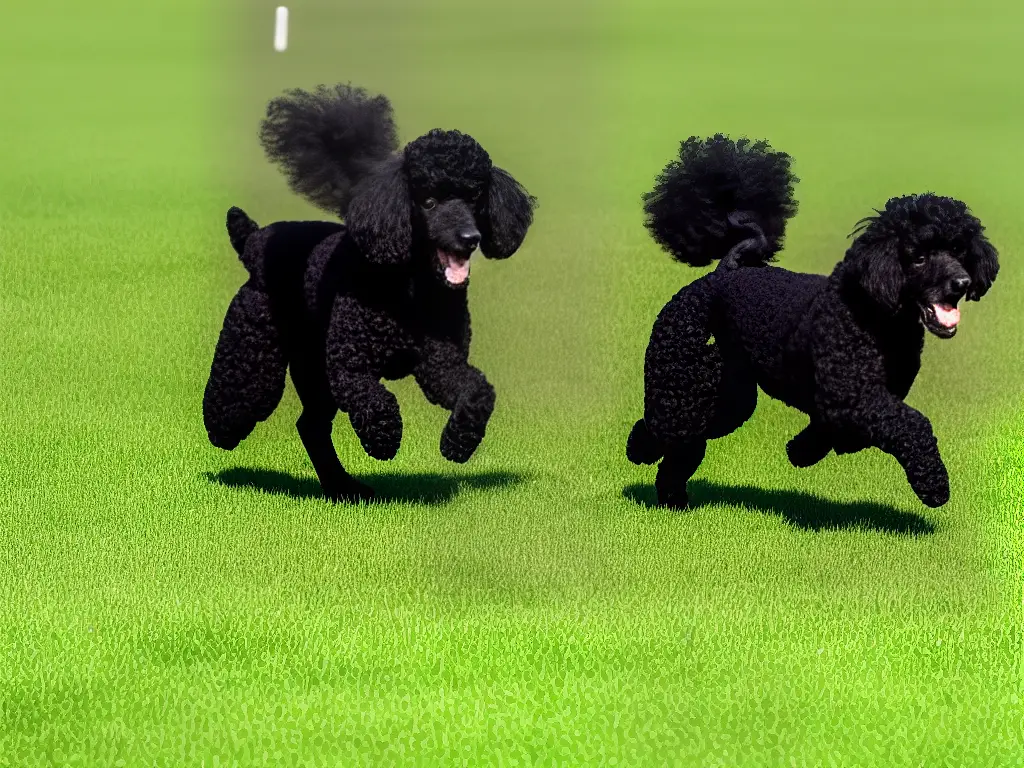
Puppy socialization
Moving on to the importance of early socialization, poodle puppies, much like other breeds, require proper exposure to develop desired behavior and adaptability to different environments. The critical period for socialization for most puppies occurs between the ages of 3 and 14 weeks, during which they are more receptive to new experiences and encounters. By ensuring your poodle puppy experiences positive interactions with other animals, people, and various environments during this crucial stage, you are setting them up for long-term success and seamless acclimation into their new home environment.
To effectively socialize your poodle puppy, it is crucial to introduce them to a wide range of people, including individuals of various ages, sizes, and ethnic backgrounds. This exposure will help them become more comfortable around different people, minimizing the risk of developing fear or aggression. During these interactions, it is essential to monitor your puppy’s body language and responses to ensure they are comfortable and not overwhelmed. If your puppy displays signs of stress or fear, it’s necessary to give them a break and gradually reintroduce the stimulus at their own pace.
Introducing your poodle puppy to other dogs and animals is also a critical component of socialization. During these interactions, try to set up positive experiences with well-behaved, vaccinated dogs that will act as suitable playmates for your puppy. In addition to dogs, exposing your poodle to other household pets, such as cats, can help them learn about their boundaries and hierarchies in a multi-pet environment. Playdates and puppy training classes are excellent opportunities to socialize your puppy while reinforcing proper behavior and etiquette around other animals.
Exposing your poodle puppy to various environments and stimuli is equally crucial in their socialization process. This can involve activities such as car rides, visits to the park, or walking on different types of surfaces. These experiences help familiarize your puppy with various sights, sounds, and smells, making them more adaptable to future changes in their environment. Additionally, these outings provide ample opportunities for your poodle to engage in positive experiences with new people and animals.
Positive reinforcement is essential in a poodle puppy’s socialization process, helping them develop and reinforce good behavior while minimizing fear or anxiety. By creating pleasant associations with new experiences, your poodle grows up to be a well-adjusted, confident, and well-behaved companion. Keep in mind that patience and consistency are key to successful socialization, ensuring your poodle puppy’s continued happiness and well-being.
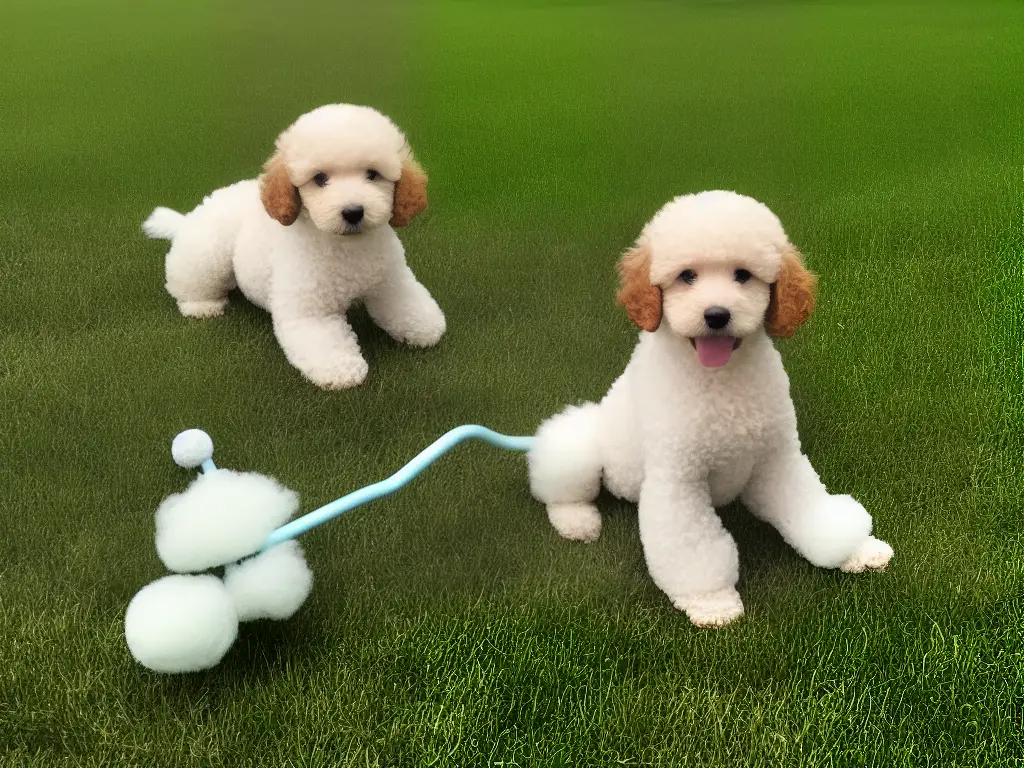
Training techniques
As highly intelligent, versatile, and trainable dogs, poodles can excel in various dog sports and activities. Poodles respond exceptionally well to positive reinforcement training, which involves rewarding them for desired behavior instead of punishing them for undesirable actions. This method works particularly well with poodles since they are eager to please and have a strong desire to work with their human companions. To maintain their interest and motivation, be sure to offer regular praise, affection, and treats, reinforcing their efforts as they learn new skills or practice existing ones.
Clicker training, a subset of positive reinforcement training, is another highly suitable technique for poodles. It involves using a small device that emits a distinct clicking noise when pressed, signaling to your dog that they have performed the desired action correctly. The clicker is used in place of verbal cues and can be a highly effective way to communicate with your poodle during training sessions. Once your poodle has associated the clicking sound with receiving a reward, you can begin shaping the desired behavior by marking each successful repetition with a click. For example, if you want to teach your poodle to sit, you would click the device and reward them immediately after they sit down. Over time, the poodle will learn to associate the behavior with the specific command and the rewarding outcome.
Socialization is another crucial aspect of poodle training and behavior. As they are intelligent and sensitive dogs, poodles require early and consistent exposure to various people, animals, and environments to develop into well-rounded and confident adults. This involves introducing them to novel situations and stimuli during their most impressionable period, which typically occurs within their first three to four months of life. Adequate socialization helps to prevent fear, anxiety, and aggression issues that may arise in under-socialized canines. You can begin by enrolling your poodle in obedience or puppy socialization classes to encourage positive interactions with other dogs and their owners. Additionally, taking your poodle for walks in different neighborhoods, allowing them to experience various sights, sounds, and smells, will also help them become more adaptable and comfortable in their surroundings.
Another beneficial training technique for poodles, especially given their physical agility, is agility training. This activity involves guiding your dog, using verbal cues and body language, through a course of obstacles such as jumps, tunnels, weaving poles, and ramps. Agility training not only provides poodles with an opportunity to exercise and burn off excess energy but also helps to strengthen the bond between you and your dog as you work together as a team. It is an enjoyable and mentally stimulating activity that can be introduced at any stage of your poodle’s life, with courses and equipment that can be easily adapted for dogs of all ages and abilities.
In training poodles, one must remember that consistency and patience are critical components. To avoid boredom or disinterest due to monotonous repetition, introducing various training exercises and challenges can help pique their interest and maintain engagement. Employing a consistent training routine, with clear expectations and consequences, ensures that your poodle grasps their expected behavior and develops positive habits. By utilizing diverse training methods and incorporating plenty of positive reinforcement, you will foster a strong relationship and an obedient, well-behaved canine companion.
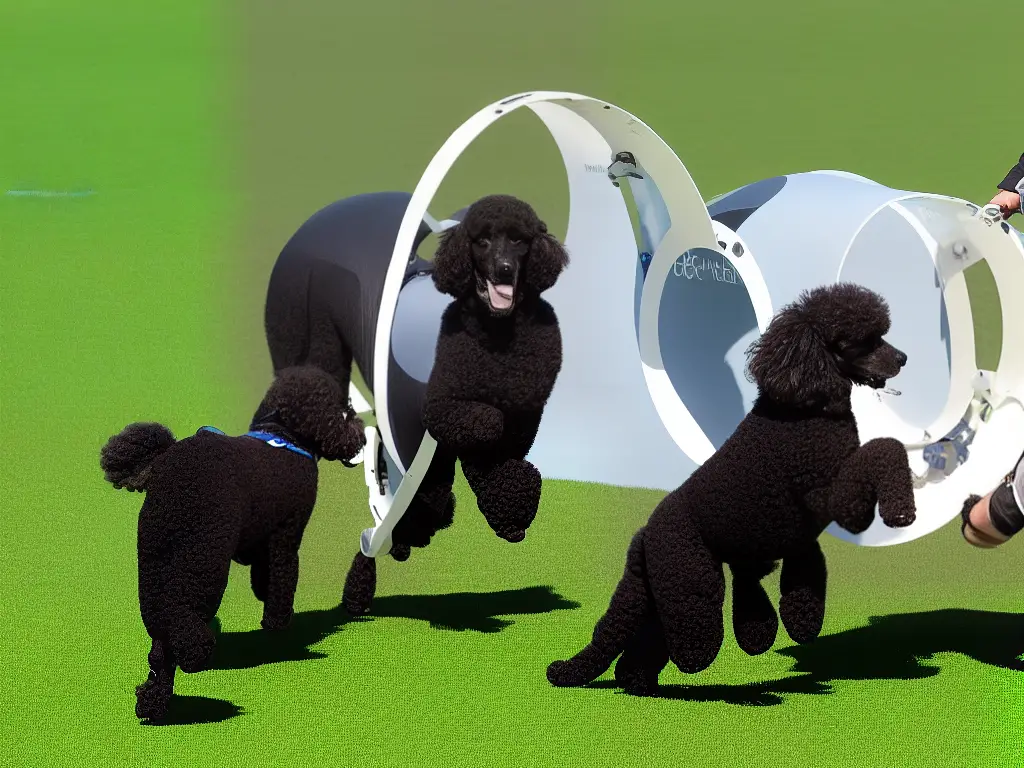
Poodle body language
Moving forward, it is also imperative to understand poodle body language to comprehend their behavior and emotions better. Poodles are expressive and intelligent dogs, so recognizing their body language can provide valuable insights into their feelings and needs, ultimately leading to a comprehensive understanding of your canine companion.
One of the critical elements to look for in a poodle’s body language is their ears. Poodles naturally have floppy ears, so when they are alert or excited, they will raise them slightly. If their ears are pulled back tightly against their head, this may indicate fear or submission. In contrast, if they are held outward, this could be a sign of curiosity or interest in their surroundings.
Another factor to consider when deciphering poodle body language is their tail posture. Generally, poodles carry their tails in a raised position, so when they are happy and relaxed, their tail may be held loose and high. A rigid upright tail could suggest arousal or excitement, while a lowered or tucked tail might indicate that the dog is feeling fearful or submissive. Observing tail wagging is also essential: fast wagging usually signals pleasure, whereas slow wagging might show uncertainty or signaling a potential threat.
Poodle facial expressions also provide valuable insights into their emotions and intentions. Observe their eyes, as eye contact can indicate engagement and attentiveness. When a poodle looks at you with wide, open eyes, they are likely feeling happy and comfortable. However, if their eyes become narrow and their gaze intense, this could signify fear or aggression. Similarly, the mouth and lips can give clues to a poodle’s emotional state. A relaxed, open mouth often suggests happiness, while lips pulled back to reveal the teeth may indicate a warning or the possibility of aggression.
Posture and body movements play a significant role in poodle body language as well. A poodle in a relaxed state will have loose limbs, allowing them to move with ease. On the other hand, a tense or anxious poodle may have a stiff posture, with the weight shifted toward the rear or front legs. Poodles may also display a “play bow” when they are feeling playful or inviting other dogs or humans to engage. In this position, the front legs are bent, lowering the chest to the ground, while the hindquarters remain in the air.
Understanding poodle behavior is essential for maintaining a strong bond with your furry companion. To do so, it is necessary to familiarize yourself with their body language, focusing on their overall body posture, movement, and other communication signals. Poodle’s unique coloration can sometimes obscure their facial expressions, making these other cues even more crucial to observe and understand.
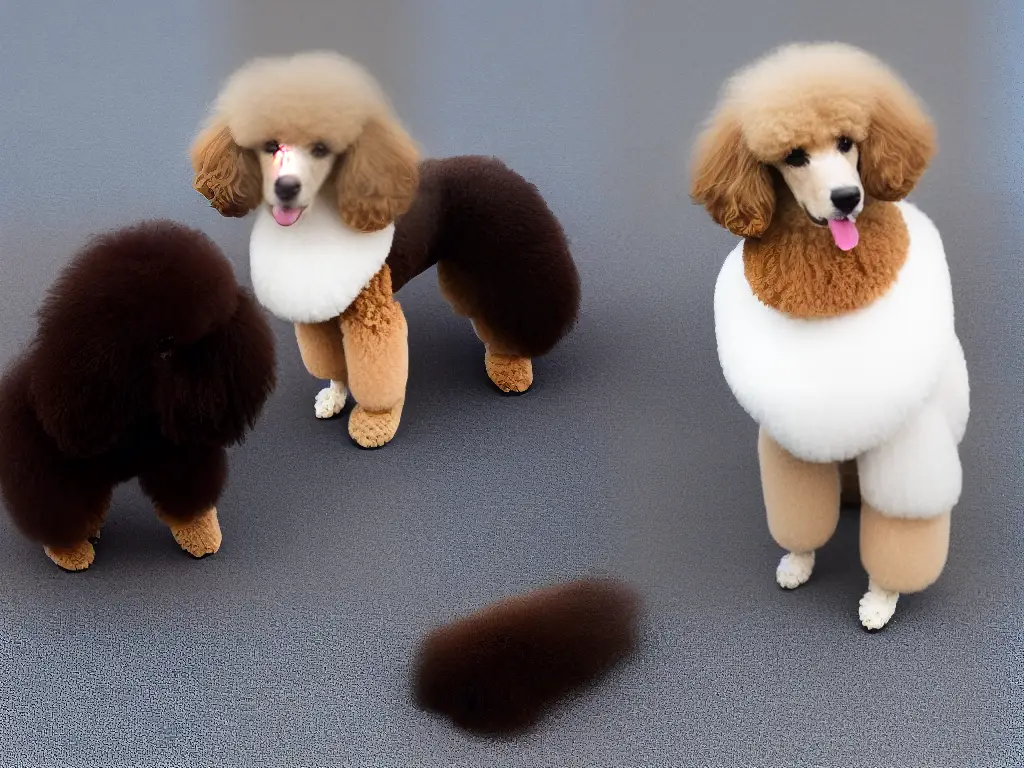
Breed-specific health issues
One factor that can influence poodle behavior is their health, specifically common issues such as hip dysplasia. This genetic disorder, which causes abnormal hip joint development and subsequent wear and tear, can lead to pain, joint instability, and eventually arthritis. As a result, poodles with hip dysplasia may display different behaviors, such as reduced playfulness and energy levels or increased aggression and irritability, especially when the affected area is touched or when they are in pain. Recognizing these behavioral changes can help you better address your poodle’s needs and maintain a happy and healthy relationship.
Another health concern for poodles is progressive retinal atrophy (PRA), a group of degenerative eye diseases that cause gradual vision loss and blindness. PRA affects poodles’ behavior as they struggle to adjust to their diminishing vision. As their vision worsens, affected poodles may become more hesitant or cautious in their movements, as well as more reliant on their other senses, like hearing and smell, to navigate their environment. Poodles with PRA might also show signs of anxiety or fear when they’re in unfamiliar surroundings or when they can’t see their owners clearly.
Poodles can also suffer from idiopathic epilepsy, a neurological disorder that manifests as recurrent seizures. Seizures can vary in severity from mild to severe, and they can cause a variety of abnormal behaviors such as muscle twitching, loss of consciousness, or even uncontrolled running and barking. In between seizures, poodles with epilepsy might appear perfectly normal, but the stress of experiencing recurrent seizures and the underlying neurological dysfunction can contribute to behavioral changes like irritability, hyperactivity, or increased clinginess to their owners.
In addition to these breed-specific health issues, poodles can also develop various allergies, which can result in skin irritations, itching, and inflammation. Poodles suffering from allergies may exhibit behavior changes, such as obsessively licking, biting, or scratching certain areas of their body, causing skin sores and infections. Allergies can be triggered by various factors, including certain foods, environmental allergens, or contact with particular substances. Diligent observation of a poodle’s behavior and physical condition can help in identifying the presence of allergies and taking appropriate action to alleviate the symptoms.
One important aspect of poodle behavior to consider is the impact of dental health. Poodles are prone to dental health issues, such as plaque and tartar buildup, due to the crowded alignment of their teeth, which can lead to periodontal disease. These dental problems may cause discomfort while eating or playing with chew toys, leading to changes in behavior like loss of interest in play, reduced appetite, or premature tooth loss. As a result, regular dental check-ups and good oral hygiene practices are essential to keep a poodle’s dental health in good condition and prevent any associated behavioral issues.

Physical exercise
In addition to dental health, physical exercise plays a crucial role in a poodle’s overall well-being and behavior. Poodles are intelligent, energetic dogs that require sufficient physical activity to keep their minds stimulated and expend their energy in a healthy manner. Engaging in regular exercise not only contributes to keeping them in shape and maintaining a healthy weight but also helps prevent the development of undesirable habits and destructive behaviors, such as excessive barking, digging, or chewing. Taking care of a poodle’s dental health and ensuring they get enough exercise can result in a well-adjusted, happy, and healthy dog.
Different types and sizes of poodles have varying exercise needs, with smaller poodles like the toy or miniature versions requiring less strenuous activity compared to larger standard poodles. Generally, poodles should engage in at least 30 minutes to an hour of daily exercise, which can include activities such as walking, jogging, swimming, or playing fetch. Apart from maintaining their physical health, these activities also allow poodles to socialize and bond with their owners, instilling obedience and trust.
Incorporating mental stimulation into your poodle’s exercise routine is equally important. Poodles are known for their sharp intellect and problem-solving abilities, making them ideal candidates for various canine sports such as agility, obedience trials, and scent detection. These activities not only provide physical exertion but also enable mental challenges that help in preventing cognitive decline and boredom. Mental stimulation can also be offered in the form of puzzle toys, interactive games, or training sessions that focus on learning new commands and tricks.
Besides structured activities, poodles can also benefit from unscheduled playtime and exploration. Visiting dog parks or engaging in off-leash play sessions with other dogs help in reinforcing essential socialization skills. Smaller poodles may also enjoy indoor play sessions, which must be supervised to prevent injuries. While exercising your poodle, always be mindful of their physical capabilities and limitations, adjusting the intensity and duration accordingly. Additionally, regular veterinarian check-ups are essential as your poodle ages, ensuring that they continue to receive the appropriate amount of exercise for their specific health needs.
Observing your poodle’s cues and preferences when it comes to physical activity can help enhance their overall exercise experience and well-being. Some poodles may prefer swimming to running, while others might enjoy a rousing game of fetch more than long walks. By paying attention to your poodle’s interests and physical needs, you contribute to their happiness, ultimately building a stronger bond and promoting a well-rounded and well-behaved companion.
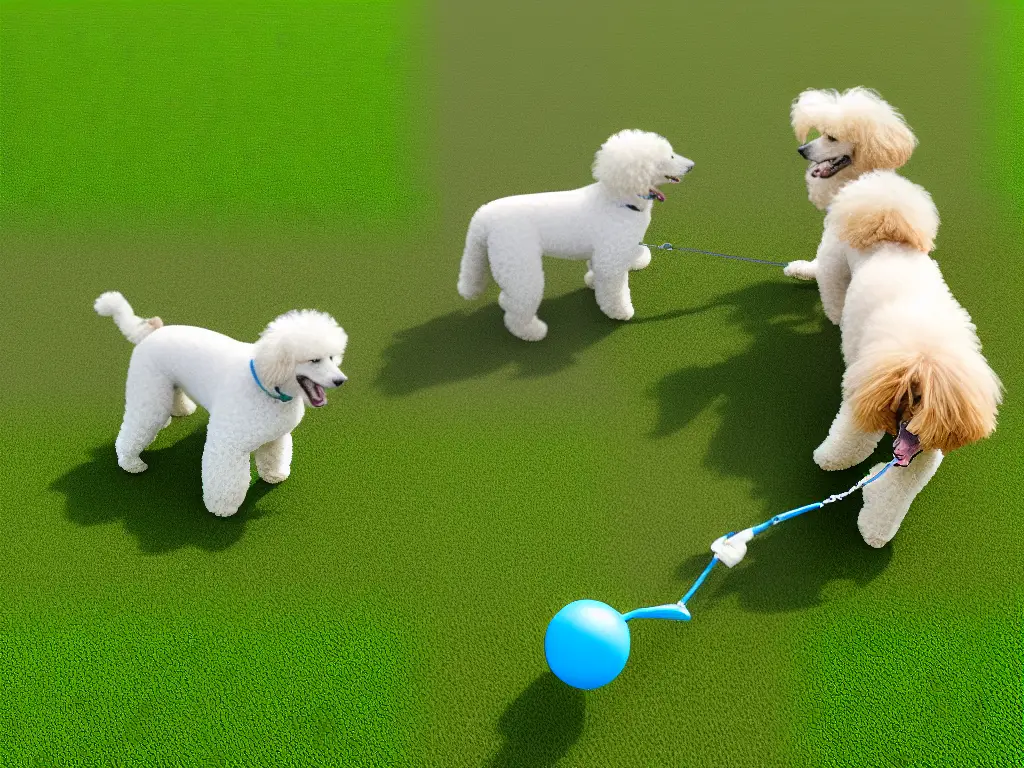
Mental stimulation
In addition to physical exercise, poodles are known for their intelligence and high energy levels, and therefore, they require regular mental stimulation to keep their minds sharp and prevent boredom. Mental stimulation contributes to a poodle’s overall well-being by reducing stress and anxiety, promoting good behavior, and strengthening the bond between the dog and its owner. Inadequate mental stimulation can lead to restlessness, excessive barking, or even destructive behavior as a result of boredom or frustration.
One effective way to provide mental stimulation for poodles is by engaging them in interactive puzzles and games that challenge their intelligence. Puzzle toys come in various forms, such as treat-dispensing toys or toys that require the dog to solve a problem to access a reward. These toys not only keep the dog’s mind engaged but also offer a sense of accomplishment and satisfaction when they succeed in solving the puzzle. When choosing a suitable puzzle toy, it is essential to consider the dog’s age, size, and cognitive abilities to ensure it remains challenging yet achievable for them.
Another important aspect of mental stimulation is teaching poodles new tricks and reinforcing existing commands. This can be done through regular obedience training sessions that focus on new tricks or refining previously learned commands. It is essential to use positive reinforcement, such as treats or praise, to encourage good behavior and prevent frustration during these sessions. Training sessions can also be an excellent opportunity for owners and their poodles to bond and build trust. Moreover, activities like agility training or canine sports can be a fun way of providing both physical and mental stimulation while honing their skills.
Socialization is another crucial element of mental stimulation for poodles. Regular exposure to different people, animals, and environments helps prevent their natural curiosity from turning into fear or anxiety. Arrange playdates with other dogs or take your poodle to dog-friendly parks or events to engage with other dogs and people. These social interactions not only enrich a poodle’s mental environment but also provide additional opportunities to practice good manners and obedience in various situations.
In addition to toys, games, and training, owners should also consider incorporating scent games and nose work activities into a poodle’s daily routine. Poodles have a keen sense of smell, and these activities can be mentally engaging and challenging for them. Some examples of scent games include hiding treats or their favorite toys around the house for them to find or creating DIY scent detection activities. Ultimately, providing various forms of mental stimulation is essential for maintaining a well-behaved, happy, and healthy poodle. Investing a little time and effort into providing daily mental challenges will go a long way in ensuring your poodle’s overall well-being and happiness.
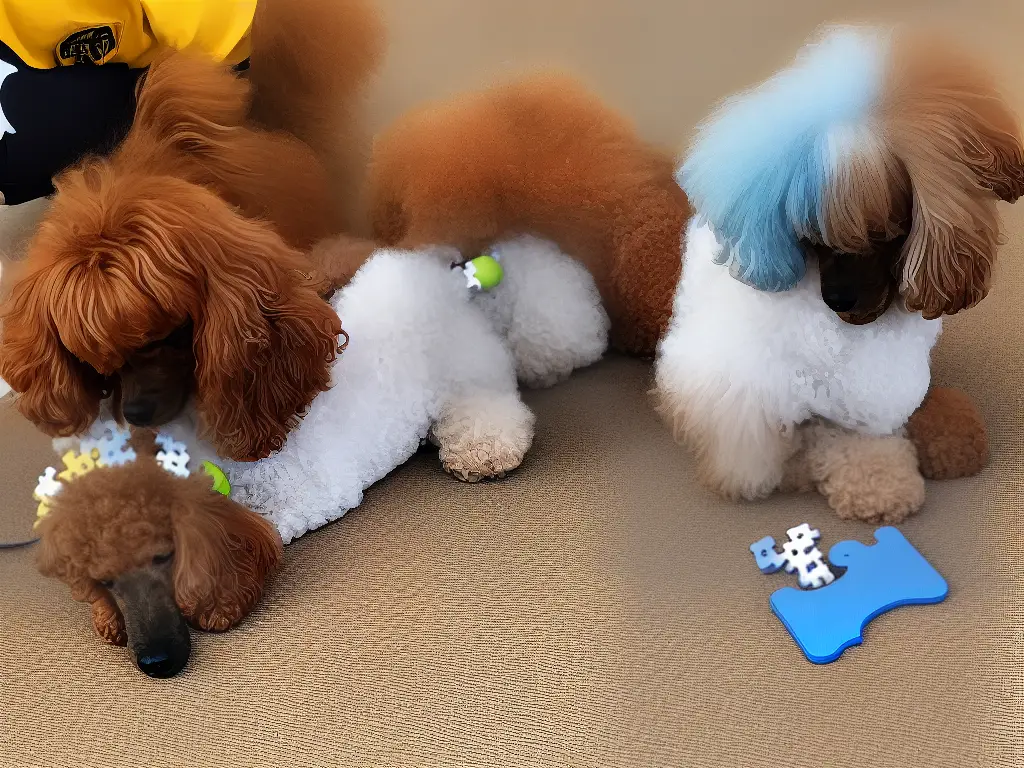
Ultimately, successfully understanding and managing poodle behavior lies in learning about their breed history, recognizing their temperament, and dedicating time to training, exercise, and mental stimulation. By doing so, a poodle owner can establish respectful communication and a close relationship with their pet, ensuring a happy, healthy, and well-behaved companion for many years to come.
